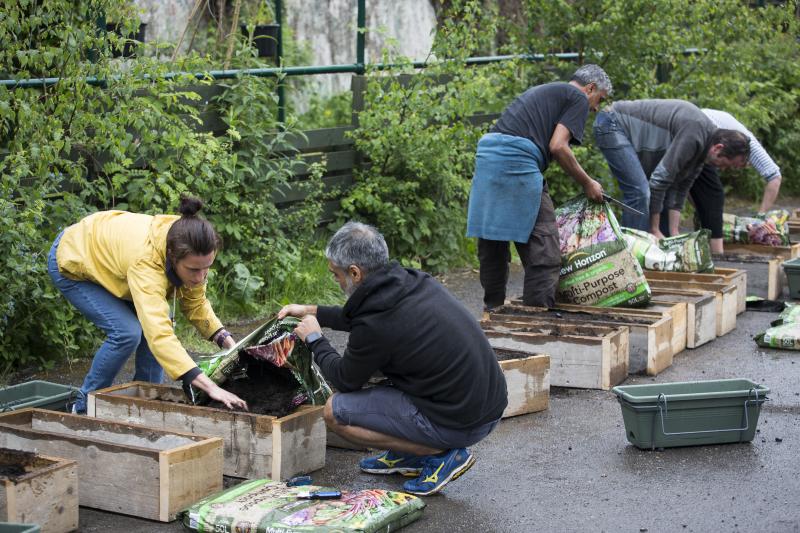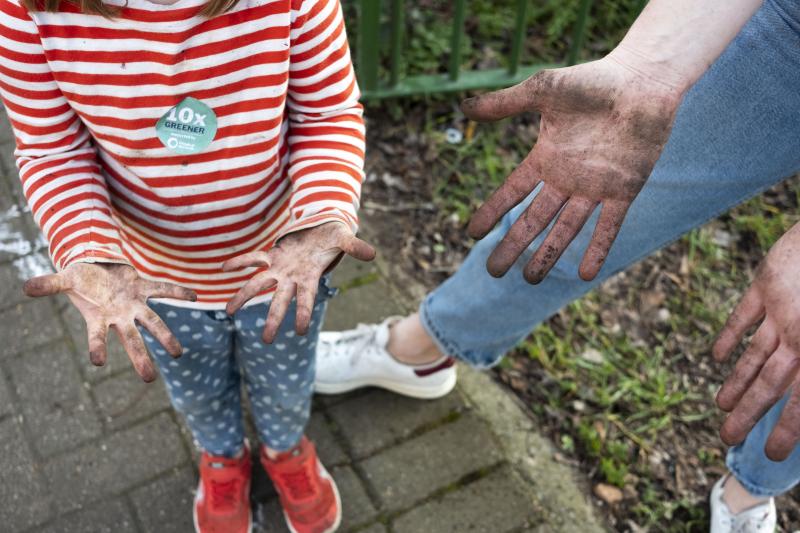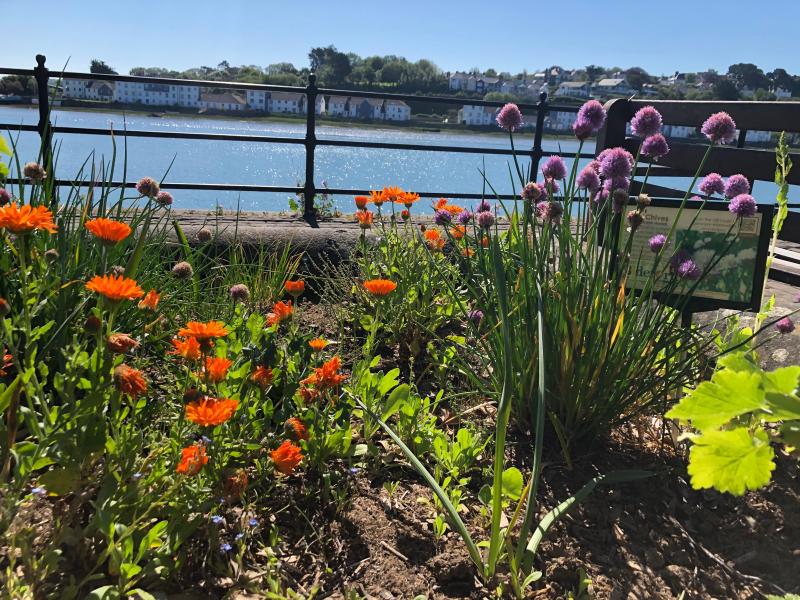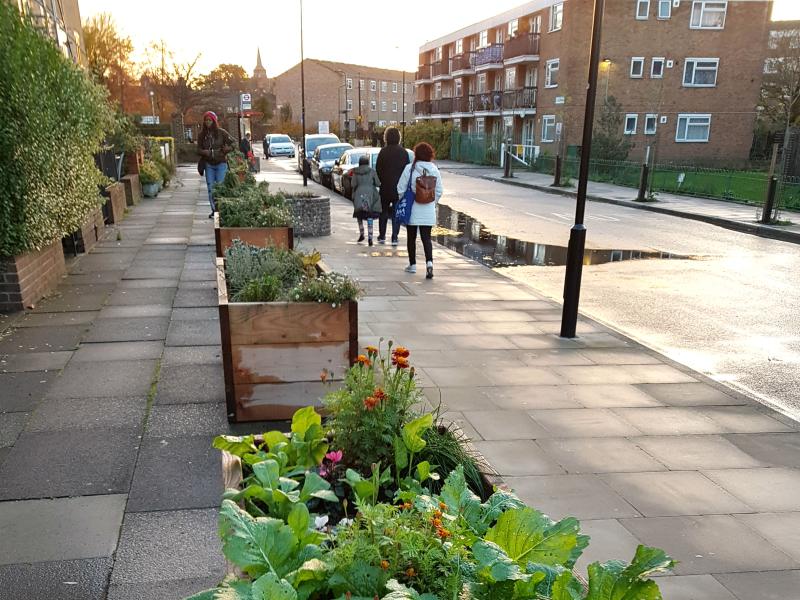Joanna Watson14 Aug 2023
The vision was big – to make our neighbourhoods 10x Greener – but we started small. Back in 2018, the Innovation Team at Friends of the Earth built on some insights about nature-deprived streets and set up an experiment that turned into the Postcode Gardener programme. We knew that many people wanted their neighbourhoods to be greener but despite initial enthusiasm, community gardening often fails because people lack the time, money, the skills or the knowledge to maintain them.
When we ran a community gardening event in Hackney London E5, we found that people loved working with plants and growing and digging, involving their kids and learning new skills but crucially, at a time of such social disconnection, they really enjoyed the opportunity to meet and work with their neighbours.
We wondered what would happen if they hired a professional gardener to help green their streets and neglected public spaces? And so the Postcode Gardener was born – a role that involves a mix of gardening in public spaces (not private gardens), and community organising, funded by the community, to help local people connect with nature and with each other.
Test on the ground
Our first pilot project was in Hackney, East London, followed by Bideford in Devon and Chester in Cheshire. The first two are still thriving and we are now building on many of the learnings to roll out the programme in some of the most nature-deprived places in the UK. True to Friends of the Earth’s mission to help make the environment better for marginalised communities most impacted by urban decay, we chose our next 3 locations by overlaying multiple deprivation data (areas subject to air pollution, over-heating, lack of green space and trees, poor public transport links) with demographic data on specific locations in several cities.
A powerful partnership to implement the vision
Protecting the natural world has been at the heart of The Co-operative Bank’s unique, customer-led Ethical Policy for over 30 years, driven by their customers’ concerns for biodiversity and the environment. So we are delighted to have recently partnered with The Co-operative Bank on an ambitious plan to scale-up the Postcode Gardener programme over the next 3 years.
We are now engaged in setting up projects with partners rooted in the community following deep discovery work - workshops, focus groups, interviews with local people to understand to what people want to see happen around urban greening, barriers for getting involved, what a dream project would look like.
The gardeners do a range of activities to restore nature in the community – from sharing gardening skills to breaking up concrete, planting tree pits and planters, creating wildlife corridors and wildflower mini-meadows and developing growing spaces for edible plants.
Some of our key learnings:
Dream big but start small
Start with one neighbourhood in your chosen location so you keep the relationships manageable. But make sure the community gets that they’re part of a much bigger vision so there’s a sense of ambition and scale. Relationships take time to build and you can’t cut corners. You have to work at the speed of trust. Fire people’s imagination with visions of a better future. The visual arts can be a great way to do this as part of improving the local environment. A beautiful mural of a sparrowhawk was painted on a gable-end in E5 and chalked messages on blackboards created a sense of immediacy and accessibility.
Make with, not for
You need to listen to the community and co-create the vision. In a review, we acknowledged the initial pilot was launched without sufficiently diverse community consultation and missed out on including the lived experience of people from under-represented backgrounds. The process we are now following is addressing this lack of inclusion. There is often initial suspicion over big organisations coming into the community and it's important to show humility at the outset. For projects to have longevity we need to manage expectations and not over-promise.
Fail, take notice and move on
We haven’t yet found a sustainable business model to build that longevity, but we have some areas of promise. It’s been a bumpy ride. Achieving sufficient crowdfunding for the initial project and finding effective ways to measure impact have been challenging. It’s all too easy to load expectations on an individual to be both an inspiring gardener and a brilliant community organiser, especially since so much depends on the support provided by the host partner and the enthusiasm of the residents to participate. It can be a lonely role. Regularly review the work – is it delivering the vision? Do you need to pivot and try something new? We identified many problems in the initial approach through an independent review and this next phase will take up many of the actions recommended within it.
Stay flexible and take care of one another
Working on multiple community projects and building relationships is hard and can be very intense. Whether you’re leading or coordinating the programme, you’re a postcode gardener or volunteering within the community, you need to find downtime, to remain flexible and build support networks. Ultimately, we want to create ways in which postcode gardeners can share ideas and support each other, learning from diverse experiences as well as addressing the potential sense of isolation inherent in the role
Build the vision
We are building a world we want to live in - we don't just want to get this across the line, we want it to reflect our values. And we are so fortunate that the Co-operative Bank shares our vision. We’re working together to bring back nature by helping to restore greenery and wildlife in over one thousand nature-deprived spaces across the country. Our multi-year partnership will address nature deprivation in communities through the Postcode Gardener programme.





